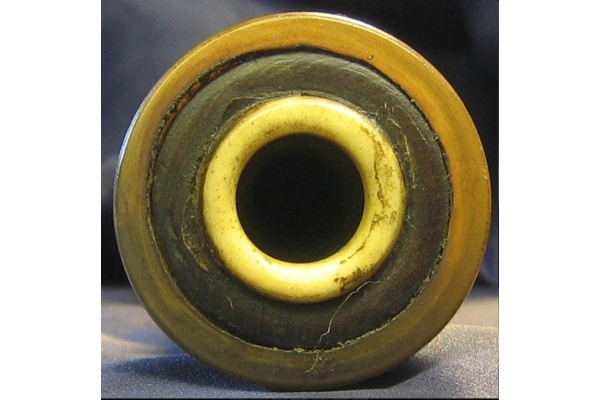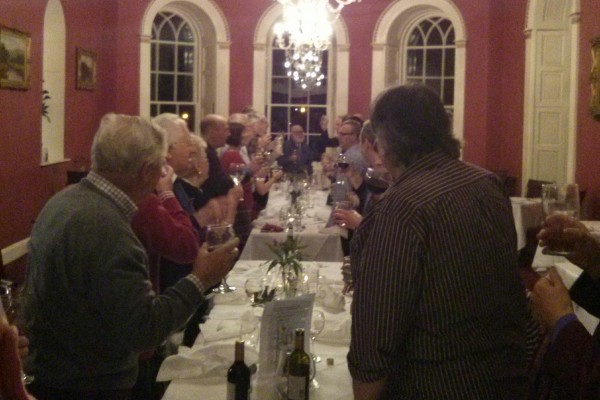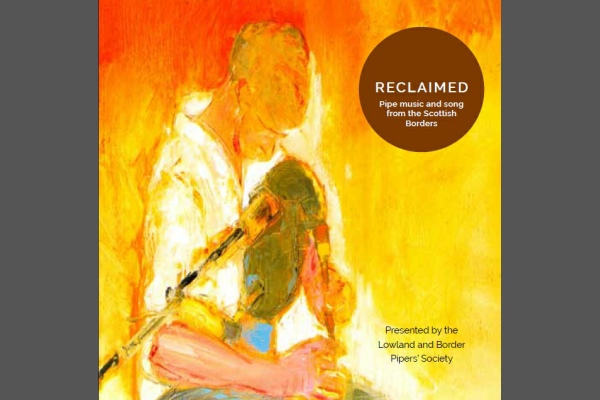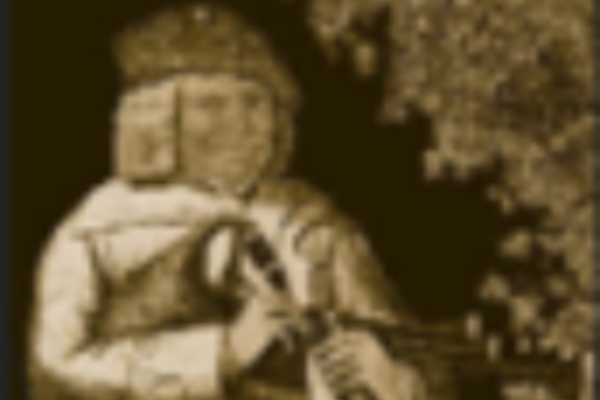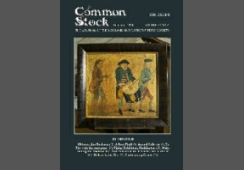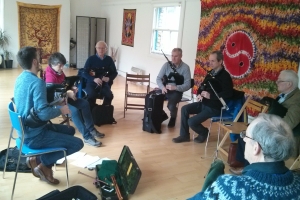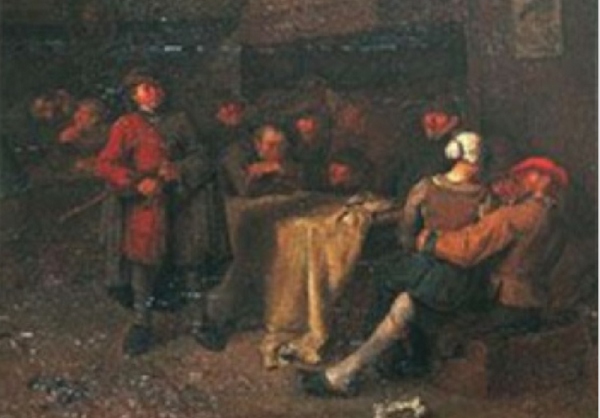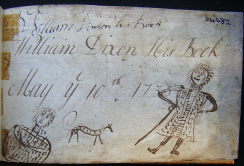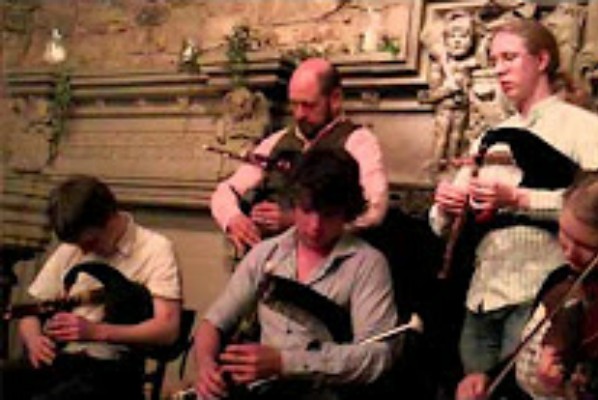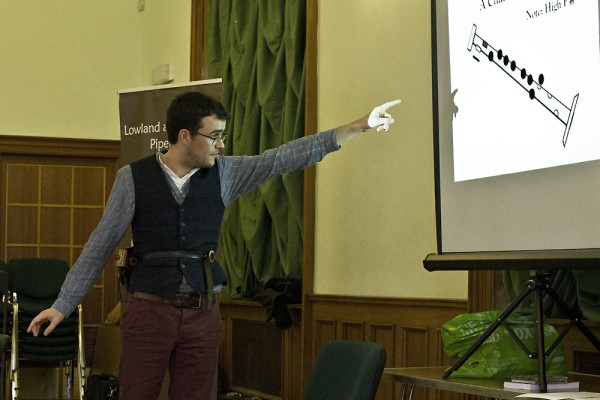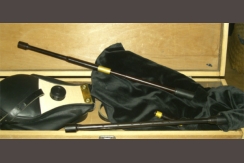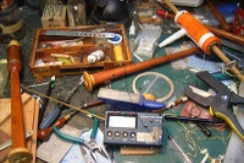News of Jock’s death on October 26th came as a shock to many members across the world; here we’ve included some of the memories we received. First, from Julian Goodacre
I was saddened to hear that Jock Agnew had died. He was a tireless worker for the Society, who put an enormous amount of his time and energy into encouraging other people to play bellows pipes, as well as leaving us with an amazing legacy of excellent written material.
Jock took part in Hamish Moore’s annual bellows piping course that ran for several years in the early 1980’s at Easter time as part of the Edinburgh Folk Festival. That was when I first met him and his concertina-playing partner Sam, and we became friends. Jock had retired from the Merchant Navy but had never lost his love of the sea and of sailing. He had learnt to play the Highland pipes many years previously but had recently become keen to play bellows pipes. This was early days for the bellows revival and Hamish was the first person who had ever taught bellows piping. There was a special pioneering feeling to that core group of pipers who gathered each year from different parts of the UK. Jock was very much part of this group and was so fired-up with enthusiasm by Hamish’s courses that he returned south and started a monthly bellows piping session in central London. This became an important event for many bellows pipers in the south because as well as the music sessions, Jock spent time helping novice pipers with their playing and pipe maintenance. He was big on pipe maintenance.

The Society always scheduled its annual competition to coincide with the Edinburgh Folk Festival and right from the start Jock would enter as many classes as possible. He and Sam regularly entered in the Duet Class, playing small pipes and concertina. One year Sam was not able to attend, and Jock, never at a loss, entered the Duet Class on his own playing small pipes with a mouth organ on a rack around his neck. Jock, being Jock, then proceeded to write an article for Common Stock on how he developed this technique! At another competition I recall him playing two sets of smallpipes simultaneously in the Duet Class. I can’t exactly recall how he achieved this, but it worked, sort of, and it was a good laugh! Jock was always up for a bit of daft amusement. And he never apologised for it.

Solo duet on two sets of smallpipes June, 2006 (only one set of bellows)
Jock became Editor of Common Stock in June 1992, taking over from Jim Gilchrist. After this it became clear that, though retired, Jock had boundless energy. Over the next 13 years he conscientiously produced 25 issues. I was an active member of the committee for most of the time he was Editor, and it was an enormous asset for us to know that each issue would be completed and posted out on time. We just let him get on with it and that left us to concentrate on other matters. He had a mental plan of the topics he wanted included in the next few issues and occasionally produced an issue devoted to a specific piping theme. He certainly had the knack of politely pressurising people into writing articles on time. I used to joke with him that I could sense an iron fist beneath his velvet glove! Certainly, his excellent results spoke for themselves.
He was the major force behind writing and collating material for More Power To Your Elbow- the Society’s definitive tutor for the bellows pipes. This was a massive undertaking which involved, not only writing and collating all the text, but also creating illustrations and overseeing the recording and production of a CD-ROM. This took him a couple of years, and is regarded as the definitive tutor.
Once Jock had made up his mind it could be very hard to make him change it. I recall that in 2003 after he had spent two years working on More Power to Your Elbow, the committee received the long awaited draft copy for our approval and we were all surprised that Jock had not included his name anywhere in the book. We tried to persuade him to put his name on the front cover but he, determined as ever, flatly refused. He did eventually and reluctantly agree to have his name, in small print, included on the inside title page.
Creating that book was a labour of love and, as if this wasn’t enough, he then worked closely with Martin Lowe to write and produce most of The Wind in The Bellows, the Society’s manual for teaching bellows pipes, which was published in 2009. On that occasion he did include his name - in the Acknowledgements on page 3.
He was a very determined man – once he began any project, he was certain to see it through to its completion. Both these books are major works; each is over a hundred pages long. Only Sam will be aware of the weeks, months and years of his life they took to complete. What a legacy he left for the Society and the Piping World!
He had clever ways of politely coaxing written contributions from people. I remember one time when he was preparing a tune book for the Society he asked me, as Chairman, to write the Introduction, a task which I kept on putting off. He must have become tired of phoning me to remind me of my promise so he went ahead and wrote the Introduction himself, emailed it to me and told me that in a week he was going to publish it with my name at the bottom unless I chose to write my own version. A remarkably successful technique - I completed it immediately! He was a canny man!
Where did he get all his energy from? He was long retired yet, as well as doing all this work for the Society and organising the London meetings, he managed to spend extended spells sailing in and around the UK. And somewhere along the line he produced a least two cassettes; Lowland Amusement (reviewed in Common Stock June 1993) on border pipes and later A Piping Hot Christmas, played by his folk group Celtic Fringe, which consisted of Jock, Sam on concertina and Alan Lake on guitar. I spoke to Sam recently and she told me that though his health had been deteriorating in his final two years, he never lost his mischievous sense of humour right to the end. When Jock and Sam first met they had had both lost their spouses in the same year, and began to find solace in each other’s company which developed into their long and loving relationship. They spent 37 happy years together. Jock died at home; Sam and his two sons and daughter were with him.
I asked Sam about Jock’s reluctance to have his name included on the cover of the two manuals that he created. She said she had also tried to encourage him with this and that his reply had always been, “It’s not about me, it’s about the pipes”.
Well Jock, I have written this and it is about you and not about the pipes. You will be missed
.
Julian Goodacre November 8th, 2020
Iain Macdonald
I didn't know Jock very well, we probably only met up at the Collogue, but in conversation we found we had a common interest in sailing. He let slip that he had a yacht on the south coast where he lived. I was very interested as all of my experience is on the west coast of Scotland, a very different kettle of fish from the English Channel.
Some time later out of the blue I got a telephone call, "Would you like to come for a week's sailing?" Would I!
We met up in a pub in Maldon, Jock was a bit down as he had invited a couple on the trip but the wife was very ill in hospital so it would just be the two of us.
It was then Jock announced he was a certified yacht master instructor and tester. Although I have sailed since my teens, I learned through experience, not certificates. So I was crew and Jock the tester. We had good weather and a very interesting and informative trip over to Calais and back. Jock was a strict but fair adjudicator.
There was one little incident that will stick in my mind. We were motor sailing, that is, the sails were up and the engines running. According to the rules such a vessel should hoist a cone from the fore stay. Now as I have said I have done all my sailing in Scottish waters and I have never seen anybody complying with this edict. The boat tiller was lashed. Jock was down below making sandwiches, and I trotted forward and hoisted the cone. We were sitting in the cockpit having our lunch, when suddenly, Jock,, with a horrified look on his face, yelled "What have you done?" I didn't know.
"You've rigged the cone upside down; if anyone I know sees it my life won't be worth living - for pete's sake put it right!"
Secretly I was rather amused; protocol has never been a strong point.
I don't know whether or not I would have passed, but it was a good trip and I shall remember Jock with affection.

John Dally (USA)
After I performed miserably at the one and only LBPS comp I ever attended, I felt horrible and embarrassed. Jock took me to the pub and we had a wee ceilidh. I don't remember the name of the pub, but it looked like it was carved out of the rock. I vaguely remember it was near the Quaker Meeting house, but why I should remember that is a mystery. Jock was very supportive of me despite my horrible mash up. We became friends and he would ask me to write something for CS every few months. He would say, we really need someone to write something about and then name the topic. I was honored he thought I was up to the task. He asked me to write reviews no one else would write and being on the other side of the world, I was happy to oblige. When he came to visit it was a real pleasure and very memorable, I knew he loved to sail, so I asked a Scottish expat who owns a 30 foot sloop to take us out into Quartermaster harbor between Vashon and Maury islands. Jock's face beamed when he was given the helm, handling the boat beautifully for several hours until we sailed back to the dock. The workshop was one of the best I've ever attended on Lowland piping. He was gracious, generous and committed to the music.
In that workshop we did a comparison of BP chanters because in the class we had pipes made by Colin Ross, Jon Swayne, Nigel Richard, Richard Evans, Ray Sloan and Hamish Moore. It was interesting to compare the relative tonal qualities as well as volume and which was the most friendly (easy to play. maintain and tune). Jock spent quite a bit of time going over the original resources that were available at the time. We discussed Gordon Mooney's seminal work at length, and various LBPS publications. In those days we knew very little about variation sets. Jock didn't spend much time on them, instead focusing on Lowland reels and jigs, and a few song airs. It would be interesting to examine those same tunes today in the context of more recent research. Jock spent a good amount of time on gracing, rhythm and ornamentation, rhythm being the most important component. Most of this discussion was put in the form of questions rather than statements of fact. Jock was quick to pull us back when we went too far into the musicological or theoretical rough.
Francis Wood (London)
It was a joy to know Jock and I am saddened to hear he has gone. I don’t think I can ever remember him not looking like the kind sailor he loved to be!
Jock was an occasional and always very welcome visitor to Northumbrian piping sessions in London. A few of us would reciprocate and go to the Lowland & Borders sessions which he hosted at Chelsea Barracks - always a pleasure!
Adam Sanderson
The first time I met Jock was by accident. I was working in London, and I wanted to get to know the Scottish Piping Society of London. I was told by the SPSL secretary that the SPSL met once a month on a Thursday at the London Scottish Regimental HQ on Horseferry Road. I made my way down there and entered the Drill Hall, my old Hendersons in their case by my side. There was a group of people sitting around a table strapping on bellows. This was a new sight to my eyes at that time, and more than a wee bit confusing. Jock introduced himself to me, and the error became clear; the SPSL secretary had given me the wrong Thursday. I prepared to leave, but Jock was very friendly and invited me to stay for a bit and listen, so I did. Jock was obviously a character. This was not only my first meeting with Jock, but also my first meeting with the Scottish smallpipes. He also gave me a copy of a Common Stock magazine, which I'd never heard of. I can't say that it was a Road to Damascus moment for me, I didn't have any great sudden impulse to take up the SSP and learn the music of the Lowlands and Borders, but I did join the LBPS later on so that I could subscribe to Common Stock, because I thought it was a great wee magazine. The more I read Common Stock, the more interested I became in Lowland and Border music, and this lead, after some years, to buying a set of smallpipes. I had some correspondence with Jock during this time as I was also obtaining back issues of Common Stock from him. This was done via letter; I seem to recall he was living in Essex. Jock was always friendly, patient and eager to help me, as he was on that Thursday night on Horseferry Road. That first meeting certainly planted some seeds of the Lowland variety and I was gently nudged along a path that was very different from my then current piping experience, but which has proven to be hugely rewarding. I remain very grateful to Jock for initiating me and placing my feet on that path.
Gordon Mooney (Canada) tells this extraordinary story about Jock:
“Jock claimed to me that he had played bagpipes at the deepest depth in the ocean while in the British Navy nuclear submarine. He brought his bagpipes on board to practice. Imagine the awful sound and reverberation in such a confined space – he must have been really popular, especially as he was a self-taught beginner at the time. He tells of much amusement using the submarine’s ship to surface transmissions, and of the terrible distortion heard by the surface ship of his piping recitals.”
[Ed; I have been unable to confirm this story, though Sam said “It was the obvious place to play them”:.
David Hannay
Jock Agnew made a huge contribution to the revival of the Scottish bellows blown bagpipes. Brought up in Galloway before going to sea with the merchant navy, he had learnt to play the highland pipes but became an enthusiast for the bellows pipes with a special interest in the border pipes and its music. He lived with his partner Sam in Essex where they played together in local sessions, and where he started a group for bellows pipes.
Jock was a talented teacher and for several years was a popular tutor on the LPBS summer schools in South West Scotland, where he once used a water gauge to encourage maintaining a steady pressure in the bag. He also taught abroad in North America. As a teacher he was always helpful and encouraging.
As well as teaching piping, Jock was an instructor for the RYA with his catamaran Tikkitak. Jock was versatile and played the fiddle, sometimes for Morris Dancing, and also wrote a book of children’s poems. In addition he was involved with a number of charities.
Jock leaves a big gap for his family and friends. He will also be remembered by many people for his enthusiasm and humour, and especially by those who play the bellows pipes of Scotland.

Pete Stewart
Gordon’s story reveals Jock as something of an ‘adventurer’ in his approach to piping; and perhaps the image of him playing two bellows-blown smallpipes at the same time, as he did in the LBPS Annual competition in 2006, confirms that he was not one to be bound by strict competition rules in his piping.
He was, however, a regular competitor at the Annual LBPS competitions both on solo border pipes and in a variety of duets, including those two solo ones. In 1998 he succeeded in winning the Open Border Pipes class, happily coinciding with one year your current editor won the New Composition class

Two winning editors of Common Stock at the LBPS competition, 1998
He was also a keen composer and arranger of new and old music, and produced a book of tunes for his ceilidh group “The Celtic Fringe”.and two collections of duet pipe music, Two’s Company’ and the LBPS Suggested Duets and Harmonies. The latter book contains a composition of his which I remember him playing in a competition one year; I believe it was written in memory of his first wife.

Those who knew Jock, or those who saw him defying convention and sitting on the edge of the Piping Centre stage to play his entry in the competition will remember him as a serious and light-hearted, opinionated and dedicated member of the bellows piping community, one who will be greatly missed, but whose contribution will continue to be a memorial to a remarkable man.
 Jock Agnew and ‘Sam’ Allan winning second prize in the duet for pipes and other instrument in 1997
Jock Agnew and ‘Sam’ Allan winning second prize in the duet for pipes and other instrument in 1997

